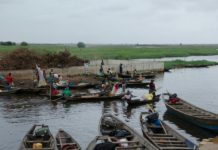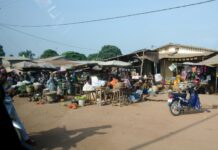Photo credit: DiasporaEngager (www.DiasporaEngager.com).
We asked the major contestants of the 29 May elections about social grants. Illustration: Lisa Nelson
GroundUp sent questions to the political parties who we believe — based on past results, opinion polls, and resources committed — are likely to be the most competitive on election day on 29 May. We will be publishing their responses, grouped by topic, over the next few days.
Today’s questions and answers deal with social grants.
The order in which we present the responses is based on seats currently held in the National Assembly. For parties without seats in the National Assembly, we order them based on how they did in the local elections, and failing that, by alphabetical order. This means the order is as follows: ANC, DA, EFF, IFP, FF Plus, ActionSA, Patriotic Alliance (PA), MK Party, and RISE Mzansi.
We emailed our questions to all these parties over two weeks ago and sent follow-up queries to those who did not respond. Some have still not responded.
Answers are very lightly edited for grammar and typos.
What is your party’s position on the Basic Income Grant? If you support it, how would you finance it?
ANC: The ANC failed to answer our questions.
DA: The DA supports the Basic Income Grant in principle. Once in government, we would investigate if a Basic Income Guarantee (BIG), tied to economic growth, is affordable and viable.
EFF: The EFF failed to answer our questions.
IFP: The IFP failed to answer our questions.
FF Plus: The FF Plus comprehends the current need for such a grant and is not against a Basic Income Grant. But South Africa cannot afford it and it is thus unsustainable. A Basic Income Grant will [not] sustainably address the plight of poverty and unemployment. To eradicate poverty we need economic growth and a conducive environment for the private sector to create job opportunities. Dependence of South Africans on social grants is not sustainable.
South Africans of employment age should rather be enabled to seek employment. This can be achieved by introducing a voucher system for job seekers which covers costs involved with job applications and interviews – such as transport, telephone and internet.
ActionSA: ActionSA has committed to introducing a Universal Basic Income Stimulus (UBIS) to alleviate poverty and support citizens’ participation in the economy. This will be funded through budget reprioritisation and tackling corruption.
The UBIS, which is linked to poverty bands, will initially be paid for a period of three years through monthly cash transfers consisting of R790 in the first year, R1,101 in the second year, and R1,622 in the third year.
PA: Our sense of it is that people accept the grant because they have little other option, but they resent it. What people want is the chance to be entrepreneurs, to have jobs and to make their own money. In this era of machines increasingly taking over, however, the idea of paying people some kind of universal income will become inescapable.
The South African government has failed dismally at growing the economy. The latent potential of our economy should see us growing at 8% a year, instead of the less than 1% we are now used to. Once we achieve that, the economy can double in a decade. That will provide plenty of funding through an improved tax base, but there will also be many more businesses and jobs.
To fund a universal grant, we need a sovereign wealth fund resourced by industries that are reliant on the mineral wealth that every South African has a share in by right of birth.
MK Party: The MK Party failed to respond to our questions.
RISE Mzansi: We don’t believe a Basic Income Grant is good enough. We prefer comprehensive social support which targets the specific needs of unemployed and underserved South Africans. A Basic Income Grant would not help South Africans address the socioeconomic challenges they face. Our Manifesto instead proposes targeted support for citizens which addresses their actual challenges, such as food vouchers for households experiencing hunger, social support for single mothers, support for work seekers for job search costs, access to skills training, and affordable public transport, among other interventions.
Would you extend the Social Relief of Distress (SRD) grant that started during the Covid epidemic? If yes, for how long?
ANC: The ANC failed to answer our questions.
DA: The DA would convert the SRD grant into a Job Seekers Grant. This would require recipients to actively seek work opportunities and provide evidence to the Department of Social Development if they continue receiving the grant. The grant’s continuation will only remain viable if there is economic growth and sufficient tax revenue to fund it. The DA opposes any tax increases to fund this expenditure and will identify savings and spending efficiencies in the public service sector to accommodate this expenditure.
EFF: The EFF failed to answer our questions.
IFP: The IFP failed to answer our questions.
FF Plus: No. Old age, disability and child care grants should rather be increased and other South Africans should be enabled to seek employment and become financially independent.
ActionSA: ActionSA supports social grants to protect the most vulnerable in our society and will therefore replace the meagre R350 SRD Grant by our proposed Universal Basic Income Stimulus (UBIS).
PA: The ANC government started paying people that grant to cushion them against the impact of the ANC’s hard lockdown (one of the strictest in the world in a country that could ill afford it). We are still paying the price today for the economic harm caused by the ANC government during Covid. Beyond that, the ANC government must now pay people this tiny grant to bribe them to try to look the other way after years of devastating economic destruction by the ANC.
We believe that what people are really crying out for is dignity through employment and an economy that works for most people. We want to put people to work to develop the country, and to pay them a better wage in the process. Grants have their place, and we need a strong social safety net, but the R350 grant is an insult to South Africans.
MK Party: The MK Party failed to answer our questions.
RISE Mzansi: RISE Mzansi believes the SRD grant should be phased out after this year. It is insufficient and unsustainable and is a poor substitute for meaningful jobs.
Would you increase or decrease the existing grants?
ANC: The ANC failed to answer our questions.
DA: The DA would ensure that the child support grant is increased to the same level as the official food poverty line. This means the child support grant, under a DA government, will be increased from R510 to R760 – an extra R250 per recipient every month. This proposal is important in a context where ANC corruption poses an existential threat to the sustainability of social grants. Only a government anchored in the DA’s track record of sound financial management can protect the sustainability of social grants.
If implemented in the next financial year, the policy proposal will require an additional R39.6-billion in funding per financial year for the existing 13.2-million recipients. This proposal is possible if the government roots out corruption, cuts waste, and generates savings. Social grants and other forms of social welfare are not an adequate substitute for a job. Yet, they remain necessary for the economy because they protect the most vulnerable in society from extreme poverty.
EFF: The EFF failed to answer our questions.
IFP: The IFP failed to answer our questions.
FF Plus: Old age, disability, child care and especially foster care grants should be increased. Child care grants should, however, be replaced by a more voucher-based system. In the long term, a dispensation which creates sustained economic growth will lessen the number of people dependent on social grants. The need for old age and child care grants will become less in a dispensation where wealth is created by economic growth and job creation.
ActionSA: ActionSA will increase existing social grants alongside the introduction of the UBIS, to protect the most vulnerable in society from the effects of poverty.
PA: We need to increase the grants, but for fewer recipients. Those who can work, should. We believe that they want to. We have a plan to give them that opportunity.
MK Party: The MK Party failed to answer our questions.
RISE Mzansi: RISE Mzansi supports the existence of social grants as an expression of the value of solidarity, ensuring that no one is allowed to fall into absolute poverty. A RISE Mzansi government would maintain the existing grants (excluding SRD) and ensure that the value of the grants is linked to inflation. At the same time, a RISE Mzansi government will actively work to develop and implement changes necessary to grow the economy, which would create jobs, and increase tax revenue to fund public goods such as quality healthcare, education, public transport and community amenities that improve people’s quality of life.
We believe that a measure of successful government would be that fewer South Africans need to access social grants over time.
What would your party do to make social grant payments more efficient and convenient?
ANC: The ANC failed to answer our questions.
DA: The DA will make it easier to apply for disability-specific grants by creating a system to screen applicants at the beginning of the process. This will help identify people who don’t qualify and reduce the number of applications that need to be fully assessed. In addition, we will make it faster for people with disabilities to get the medical assessments required for accessing disability grants by allowing private doctors to do the assessments.
EFF: The EFF failed to answer our questions.
IFP: The IFP failed to answer our questions.
FF Plus: Corruption and fraud regarding grant payments should be addressed urgently. An efficient card system and eWallet system should be implemented. The accessibility of pay-outs should be addressed – especially regarding rural recipients. Partnerships with private institutions to utilise POS (point-of-sale) is one method.
ActionSA: We will improve the fair and timely distribution of social grants by implementing prioritised institutional reform programmes at the South African Social Security Agency (SASSA) to eliminate corruption, bureaucratic inefficiencies, and to improve access to social grants.
We will also implement technological solutions, such as mobile payments and e-wallets, so grant recipients can access their funds more easily. We intend to conduct regular reviews of the grants system to ensure our people continue to have access to the social support grants they need.
PA: The easiest thing to do would be to replace the ANC as the party in charge. That would make the whole of South Africa more efficient and convenient, by the way.
RISE Mzansi: In recent years media articles have detailed the late payment of grants or how elderly recipients have to wait outdoors in bad weather. The grants provide a safety net and the payment of the grants should not create hardship or impair the dignity of the recipients.
The companies making the payments must have Service Level Agreements (SLA) in place with the Department of Social Development for reliability and customer experience. The SLAs must be routinely audited and the requirements strictly enforced.
MK Party: The MK Party failed to answer our questions.
© 2024 GroundUp. This article is licensed under a Creative Commons Attribution-NoDerivatives 4.0 International License.
You may republish this article, so long as you credit the authors and GroundUp, and do not change the text. Please include a link back to the original article.
We put an invisible pixel in the article so that we can count traffic to republishers. All analytics tools are solely on our servers. We do not give our logs to any third party. Logs are deleted after two weeks. We do not use any IP address identifying information except to count regional traffic. We are solely interested in counting hits, not tracking users. If you republish, please do not delete the invisible pixel.
Source of original article: GroundUp News (www.groundup.org.za).
The content of this article does not necessarily reflect the views or opinion of Global Diaspora News (www.GlobalDiasporaNews.com).
To submit your press release: (https://www.GlobalDiasporaNews.com/pr).
To advertise on Global Diaspora News: (www.GlobalDiasporaNews.com/ads).
Sign up to Global Diaspora News newsletter (https://www.GlobalDiasporaNews.com/newsletter/) to start receiving updates and opportunities directly in your email inbox for free.































